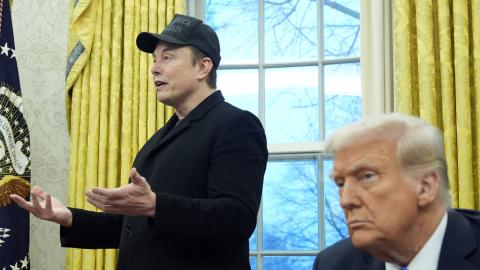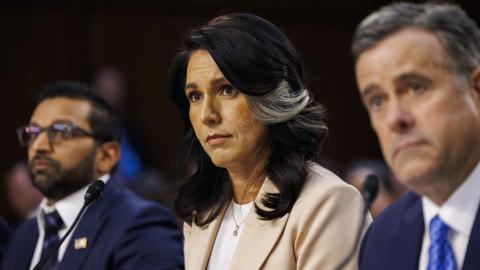US Sovereignty at Stake? Bill Aims to Prevent WHO Pandemic Treaty Without Senate Approval
U.S. Sen. Ron Johnson (R-WI) has introduced the No WHO Pandemic Preparedness Treaty Without Senate Approval Act. He's joined in the effort by other U.S. lawmakers with growing concerns about protecting U.S. sovereignty during future global health crises. One of the many issues at stake is global vaccine passports.
The bill would require any convention or agreement resulting from the work of the World Health Organization's (WHO) intergovernmental negotiating body to be deemed a treaty, requiring the advice and consent of a supermajority of the Senate.
The legislation comes as the WHO continues to move the pandemic treaty process forward and is expected to formally present a draft to member states later this month.
Johnson's bill would provide more transparency in WHO agreements and a constitutional check on the Biden administration.
"The WHO, along with our federal health agencies, failed miserably in their response to COVID-19. This failure should not be rewarded with a new international treaty that would increase the WHO's power at the expense of American sovereignty," Johnson said in a statement. "I'm proud to reintroduce this legislation to hold the WHO accountable for their failures and increase transparency for the American people. The sovereignty of the United States is not negotiable."
Sen. Johnson previously introduced the legislation in May 2022. He's joined on the bill by 16 Republican senators.
In a statement issued Monday, House Foreign Affairs Committee Chairman Michael McCaul (R-TX) and House Energy and Commerce Committee Chair Cathy Rodgers (R-WA) said, "The World Health Organization has a major credibility problem."
"Instead of leading a thorough and trustworthy investigation into the origins of the pandemic, the WHO has repeatedly kowtowed to the Chinese Communist Party and is complicit in its COVID-19 coverup. As the WHO begins the process to move this pandemic treaty forward, America's sovereign rights and biomedical leadership and innovation must be protected," the statement said.
"The CCP also must be held accountable. The Biden administration must make these their top priorities in the pandemic accord negotiations," the statement concluded.
As CBN News has reported, several watchdogs warn the move by the Biden administration appears to be a part of the process to gradually require the U.S. to bow to the WHO's controls at the beginning of the next global pandemic.
Critics say there's not a big handover of American sovereignty coming, but watchdogs say the administration is laying the groundwork for it.
Liberty Counsel Founder and Chairman Mat Staver warned Americans should pay particular attention to two of the proposed WHO amendments.
"First, one amendment will give WHO unprecedented power not just over a 'public health risk' but also over 'all risks with a potential to impact public health.' Anything can be a 'potential' risk to 'public health.' This includes access to abortion, transgene mutilations, 'climate change' and, of course, COVID," he wrote in an online blog.
"Second, the amendments change WHO from an advisory U.N. agency to a 'legally binding agreement' of 196 countries to build the capability to … detect, assess, report, and respond to public health events," the founder of the nonprofit religious law firm continued.
According to Staver, President Biden and his delegation to the WHO are pushing hard to give WHO global authority. The new amendments will be voted on during the 76th World Health Assembly meeting in May. A simple majority vote of member nations can give the WHO sweeping control.
Staver also noted a few of the concerning changes to the WHO's amendments:
- Article 1 — Change WHO from an advisory organization that makes recommendations to a governing body whose proclamations would be legally binding.
- Article 3 — Remove "respect for dignity, human rights and fundamental freedoms of people."
- Article 18 — Give WHO global authority to require medical examinations, proof of prophylaxis, and proof of vaccine, and to implement contact tracing, quarantine, and treatment.
- Articles 18, 23, 24, 27, 28, 31, 35, 36, and 44 and Annexes 6, 7, and 8— Institute a system of digital or paper global health Vaccine Passports.
- Article 44A — Redirect unspecified billions of dollars to the Pharmaceutical Hospital Emergency Industrial Complex without accountability.
- Article 45 — Allow the disclosure of a citizen's personal health data.
- Annex 10 — Create an obligation to build, provide and maintain IHR infrastructure at points of entry.
A Dangerous Threat to Freedom?
As CBN News reported in January, the WHO is preparing for the next pandemic with plans to demand vaccine passports for global travel.
President Biden signed the Bali Declaration along with other world leaders. It included a section (s.23) on "facilitating seamless international travel." It acknowledged the importance of shared technical standards and verification methods, including vaccine passports. The declaration also includes the commitment of the leaders to "support continued international dialogue and collaboration on the establishment of trusted global digital health networks that should capitalize and build on...existing standard and digital COVID-19 certificates."
Watchdogs in the U.S. continue to warn that if allowed, the health or vaccine passports would eventually track every aspect of Americans' lives, violating the U.S. Constitution, the Americans With Disabilities Act, and HIPAA, due to the fact that everyone's medical records would be a part of a worldwide database.
Regent University's Dean of the Robertson School of Government Michele Bachmann has also raised the alarm about the administration's move to have the U.S. in compliance with the WHO for any future emergencies, without a treaty ratified by the U.S. Senate.
Last December, Bachmann told health activist James Roguski she was opposed to WHO's proposed International Health Regulations amendments.
She says the following proposed changes to Article 3 are "a complete red flag": "the implementation of these regulations shall be" and crossed out, "with full respect for the dignity, human rights and fundamental freedoms of persons".
"Dignity is fundamental. Human rights are fundamental. Fundamental freedoms of persons is a bottom line, red line that all persons in the world need to have for protection," Bachmann noted. "Instead, this is focused on politics, as opposed to health. These are changes to health regulations but, the very specific agenda of equity, inclusivity, coherence - this is not defined and must be defined."
"The main concern is by striking out fundamental freedoms of persons, with full respect for the dignity and human rights, separates the individuality of all people on earth, and instead focuses on groups," she said.
"There is no such thing as group rights. There are individual rights," she pointed out.
"I highly urge every individual to vehemently oppose the proposed rules and to understand what a massive overreach this would be by the World Health Organization if these amendments are adopted," Bachmann concluded.
***Please sign up for CBN Newsletters and download the CBN News app to ensure you keep receiving the latest news.*
A Cause for Alarm?
Tony Perkins, president of the Family Research Council, agrees writing: "This week the World Health Organization (WHO) is meeting in Switzerland to advance a legally binding international accord on 'pandemic prevention, preparedness, and response.' The Biden administration has been working with the WHO on this deal which would hand over public health policy to an unaccountable, unelected, and incompetent international bureaucracy."
"This is cause for alarm," Perkins wrote. "The American people didn't elect a federal government so that they might hand over our nation's sovereignty to the WHO. This is why we're urging people to take action, we want our allies in Congress to understand the American people are awake to this attempt to circumvent the Constitution."
He points out the United States has funded the WHO for years with Congress giving the WHO $434 million in taxpayer funding in 2022 alone. So Perkins says "...we shouldn't allow unelected and unaccountable international organizations--like the WHO--to usurp our national sovereignty."
Critics Claim No Need to Worry
Some critics are rejecting the claims that the WHO accord would undermine U.S. sovereignty.
"These claims are utterly false," said Lawrence Gostin, a Georgetown University law professor and director of the university's WHO Collaborating Center on National and Global Health Law. He's been involved in the treaty's draft process, so he's clearly in favor of it.
"The United States retains sovereignty to set its own domestic public health policies," he added. "WHO does not gain any power to override domestic policy decisions."
Dr. James LeDuc, a professor at the University of Texas Medical Branch who served on a separate WHO committee that assessed parts of the international COVID-19 response, noted that the draft of the regulations would likely undergo many revisions over what could be a multi-year process if passed at all.
"Hopefully the draft zero of the proposed treaty will encourage a robust international dialogue; however, reaching agreement among 194 independent nations will likely be a very long process," he wrote in an email to the Associated Press.





